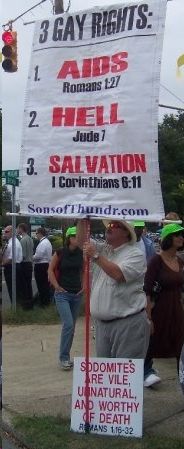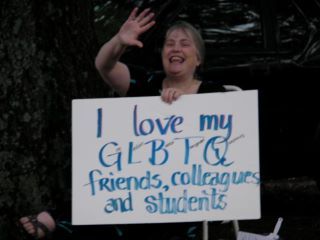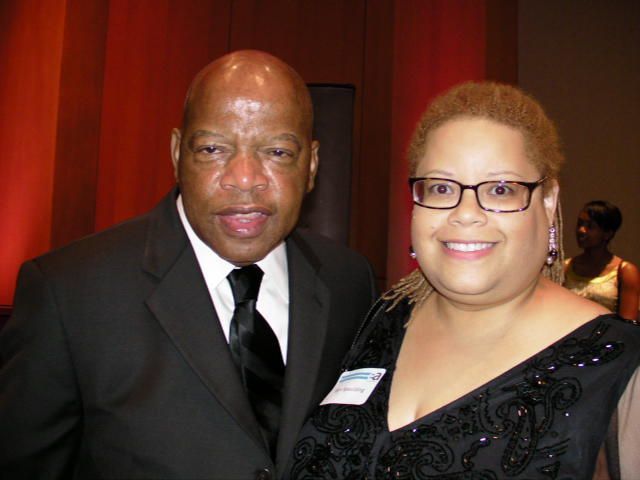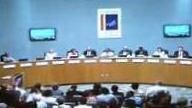
Pam Spaulding
NC Pride Keynote Address (as prepared for delivery)
Durham, NC (Duke East Campus)
September 26, 2009
Hi everyone -- it's a great gay day in the Bull City! Just a little too gray…
It's so strange to be standing up here rather than down there. I honestly wonder why I have been asked to address you today at NC Pride.
After all, I'm just a blogger, scratch that, citizen journalist. Back in July 2004 when I started Pam's House Blend, it was just a way for me to let off steam about the sad state of political affairs for the lesbian, gay, bisexual and transgender community under our last president.
 You'll recall that the 2004 election year was an unending assault on our lives with professional anti-gay organizations working hard to ensure amendments passed in states to bar gay and lesbian couples from marrying. And passed they did at the ballot box, in Missouri, Montana, Mississippi, Alabama, Arkansas, Georgia, Kentucky, Louisiana, North Dakota, Ohio, Oklahoma, Michigan and Utah. A clean, depressing sweep.
You'll recall that the 2004 election year was an unending assault on our lives with professional anti-gay organizations working hard to ensure amendments passed in states to bar gay and lesbian couples from marrying. And passed they did at the ballot box, in Missouri, Montana, Mississippi, Alabama, Arkansas, Georgia, Kentucky, Louisiana, North Dakota, Ohio, Oklahoma, Michigan and Utah. A clean, depressing sweep. What a difference five years makes, huh?! While Massachusetts has had marriage equality since May 2004, we have seen it blossom in CT, IA, MA, VT; NH (in 2010) and ME. We saw it flourish for a brief time in CA before it was voted away by mob rule with Proposition 8.
In fact, as we stand here today, we are trying to stop a massively bankrolled effort to repeal marriage equality in the state of Maine. Civil rights should never be determined at the ballot box, yet time and again, homophobia has driven people to believe that might makes right.
While marriage equality is important to me, and many of you out there, for those of us who live in NC and other states where there are few or no protections at the state level, the gains we seek are so modest, so essential, and happen all too slowly down here in the South. And that leads me to great news to report about our state. . . the gains in 2009:
Gains in 2009
* For the sixth year in a row, a proposed state constitutional marriage amendment was killed in committee. North Carolina is the last state standing in the South without an amendment. Give a cheer for that! We have to keep it at bay because the language in this discrimination amendment would not only deny same-sex couples marriage, but it would ban civil unions or any other kind of relationship recognition.
* The School Violence Prevention Actto address bullying and harassment in schools, including acts targeting LGBT students. It's sad that there was even opposition to this bill, which creates safe space for learning for all children. It marks the first time sexual orientation and gender identity are included in North Carolina law. I have to give a shout out to Equality NC; the organization received the "Most Amazing Achievement" award from the national Equality Federation because this is the first gender identity-inclusive law in the South!
* Another step forward is the passing of the Healthy Youth Act, that enables comprehensive sex education program in grades 7-9. Before this bill, abstinence-only education was the only option.
* The state held the line on funding for HIV prevention programs and the AIDS Drug Assistance Program will continue to provide low-income patients with the medicine they need.
* Second parent adoption and the welfare of children received a boost in a ruling this year by the North Carolina Court of Appeals.
* And last, but certainly not least, on August 17, the Durham City Council unanimously passed a Resolution in Support of Civil Marriage for Same Sex Couples. It was a measure submitted by resident Joshua Lee Weaver. Durham now joins Chapel Hill and Carrboroas the only cities in North Carolina that have passed such a resolution. Of course it carries no weight in terms of legal recognition, but it speaks volumes about how our city values our relationships and supports diversity. Thank you, Mayor Bell and members of the Council.
Hey Raleigh -- get on the stick - we need the other point in the Triangle covered! What's the hold up?
An aside -- that positive news is tempered by the fact that County Commissioners in at least 15 counties and one town have passed resolutions supporting a state Marriage Amendment.
While we're on the topic of that resolution, I want to talk about what I saw at the City Council meeting when it passed it. What I saw disturbed, but didn't surprise me.
This meeting drew a standing-room-only crowd to the council chambers. Many of my blog's national readers were looking for a first-hand account, so I was there to tape and Tweet it. I panned my camera to get a view of the crowd and suddenly noticed the racial divide in the room -- those who were standing and who remained seated. I didn't see any people of color standing or clapping in approval.
In fact most of them were seasoned citizens -- mostly black women who were stone-faced in disapproval. The reaction I saw made it clear that there is work to be done to build bridges in the community regarding LGBT equality, race, and religion. I wrote about this incident in The Durham News, fully expecting vigorous feedback on both sides; however it was met mostly by silence.
In hindsight, it shouldn't have surprised me. To discuss it would be like stepping on a landmine for many people.
It was equally eye-opening when longtime social justice activist Mandy Carter and I, along with several black gay and lesbian attendees, visited two members of the NC legislative black caucus during Equality NC's Day of action earlier this year. I will preface this by saying that these membersare strongly there for us on other pro-LGBT issues, but the matter of the state marriage amendment bill by some members of the black caucus is clearly a land mine. To our faces we were told by respected chair Rep. Alma Adams that LGBT issues are not "the caucus's issues" -- as in social justice issues -- and another Rep. Earline Parmon, who supports the marriage amendment bill, justified it by saying she is a minister.
That last statement sucked the air out of the room. To have an elected official answer a constituent's question by indicating she doesn't understand the separation of church and state; well, that's tragic. When I blogged about this, many asked how did we maintain our composure in the face of answers like this.
Honestly, when we left and sat down to talk about what we experienced, the shared feeling was how hurtful it was to be rendered "less-than" to our faces. I think the day taught us all a valuable lesson that spending "face time" with lawmakers to share our stories is essential, and for black LGBTs it's critical -- it's not an option to be rendered silent and invisible.
Affirming religion
Religion itself is not to blame for this; I want to note that it is wonderful to see so many houses of worship represented here today at the booths and in the parade -- give them a hand -- it's a beautiful sight to see so many affirming allies of faith here to counter the image of religious "bigotry by bullhorn" and "turn or burn" crowds who believe that hell and damnation await us.
The presence of these open and affirming houses of worship is proof that our side will win this fight for equality. The problem these anti-gay churches have is their myopic worldview -- they believe that there is only one Christian POV that should govern how all of us should live (never mind any other faiths, they don't think that far).
In the end, that limited thinking is going to sink the bible-based movement to deny us civil rights. Activists outside of the South often want to ignore or write off working for change in the region because it is steeped in religion; I think it's short-sighted. Many members of the LGBT community have indeed been so rejected and hurt by the hateful messages blasted from the pulpit that they reject faith. That's entirely understandable. But for many, they want to reconcile the faith and traditions they cherish in an environment that affirms they are human, that they are loved for who they are. And that's OK too.
 When you encounter someone who cites their religious beliefs to justify opposing the civil right of gay and lesbian couples to marry, ask them a couple of questions. 1) Do you realize that unless the couple has obtained a marriage license issued by the state, a religious marriage means nothing in the eyes of the law? 2) Do they truly believe that there isn't separation of church and state in this matter? If so, they are effectively asking the state not just to prevent us from marrying on that basis,they are also affirming state discrimination against the churches and denominations that DO want to marry those same couples. That's discrimination based on religion and I hate to break it to them -- that isunconstitutional.
When you encounter someone who cites their religious beliefs to justify opposing the civil right of gay and lesbian couples to marry, ask them a couple of questions. 1) Do you realize that unless the couple has obtained a marriage license issued by the state, a religious marriage means nothing in the eyes of the law? 2) Do they truly believe that there isn't separation of church and state in this matter? If so, they are effectively asking the state not just to prevent us from marrying on that basis,they are also affirming state discrimination against the churches and denominations that DO want to marry those same couples. That's discrimination based on religion and I hate to break it to them -- that isunconstitutional. Those opposing equality haven't any other card to play except to say it will "change" the definition of marriage, as if it hasn't changed over time. Years ago, marriage meant women were the property of men. And then the definition of marriage changed.
Several generations ago, blacks couldn't marry a person of the same race (because we were property), let alone someone of another race -- and the bible was used to justify that. And then the definition of marriage changed.
It's painful to see people of faith cite passages in holy texts to justify oppression of LGBT people when the same public admonitions are rarely delivered to the adulterers, thieves, and fornicators sitting in the pews, or worse, the person standing in the pulpit.
I recently received an email from civil rights legend and head of the NAACP, Julian Bond. He said, quote:
I do not believe the battle for LGBT rights will ever be won until we can diminish the homophobia in black communities and until more in the black LGBT community join the battle openly.
I've often wondered what would be the result of black LGBT churchgoers standing up in the churches they attend and saying "I'm gay - you know me - I'm like you. I am what God made me. Why do you treat me so badly?"
I would like to see more black LGBTs in those churches muster the courage to do this. A culture has been affirmed in too many churches is that being gay or lesbian is so horrible that it's better to have a public heterosexual identity than deal with truth telling, even if the silence contributes to the skyrocketing HIV infections in the community. The silence is killing our people.
All that said, part of the reason the closets are so tightly shut in the black community is due to the fact that LGBT people of color in large part feel there is as much racism and sexism in the larger out gay community as there is in the straight community.
I have said many times on my blog that discussing racism within the LGBT community is an incredibly difficult endeavor; I try very hard to create a safe space for this. Most white people fail to engage, remaining silent out of fear of offending someone, or worse, reveal their own biases and working through them in public, even with the anonymity of the Internet.
For blacks and other minorities, who have to learn how to integrate in the dominant culture out of necessity, they are often feel frustrated and defensive hearing the lack of knowledge exposed when whites make the tentative steps to engage. The honest truth is that, outside of working alongside people of color, there's a lot of social self-segregation going on (on both sides).
 What this lack of cross-community dialogue means for out LGBTs of color is that one has to be willing to put yourself out there to be attacked, over and over for addressing homophobia in communities of color knowing that few, if any, white LGBTs are going to come forward to have your back.
What this lack of cross-community dialogue means for out LGBTs of color is that one has to be willing to put yourself out there to be attacked, over and over for addressing homophobia in communities of color knowing that few, if any, white LGBTs are going to come forward to have your back. I see it time and again, with the excuses ranging from "I'll be called a racist" or "it doesn't feel safe to do this" or "it isn't my place to do it. " Well if you're waiting for it to be safe, it isn't going to happen.
The fantasy of a post-racial society with the election of Barack Obama as the first black president is just that, a fantasy. Just flip on the TV.
So it is in this environment that black LGBTs have a difficult choice about whether to come out, though more and more are. Fearful of losing social connections, friendships and emotional shelter provided by their faith community if they come out, black gays and lesbians in the church are intimidated.
They fear the judgment of those in the pews and the pastors spewing anti-gay bile from the pulpit. Some of these minority LGBTs simply cannot envision stepping out of the closet because they don't see a welcoming largely white LGBT community on the other side of the door.
I'm glad to see the growth of Black Prides in the state; the first Triangle Black Pride to go live next year. Don't get me wrong, I think this is a welcome development as the LGBT community is diverse on so many levels. I am still concerned that the desire and need for cultural unity often leads to self-segregation for the sake of comfort and that results in less motivation for sorely-needed bridge building. It's clear that this issue of waiting for it to "feel safe" to communicate frankly about in race (or gender and class for that matter) is tough nut to crack.
John Lewis
Thinking about what "safe" means in the context of discussing race, it reminds me of someone who didn't wait for it to be safe before he questioned discrimination.
Last Saturday I had the incredible opportunity to hear civil rights legend Congressman John Lewis speak. This man of deep faith and principle has shed blood, has been beaten unconscious and risked his life and limb repeatedly during the civil rights movement. He never hesitated, and the safety stakes were a helluva lot higher. John Lewis believes in full equality for the LGBT community and walks the walk. Congressman Lewis recalled standing at the Lincoln Memorial where he stood with Dr. Martin Luther King. When Lewis took his turn at the podium, he said:
"You tell us to wait, you tell us to be patient. We cannot wait; we cannot be patient. " You want your freedom and you want it now.
No government, be it federal or state, should tell a person who you can marry or who you cannot marry. You have a right to fall in love and get married.
So our struggle is all one struggle. It is not a struggle that lasts just for one day, one week, or one month or one year. It is a struggle of a lifetime, to build a beloved community. A community at peace with itself that recognizes dignity and the worth of every human being.
But perhaps the most powerful message was to those in the LGBT community who are waiting for equality to come to them -- Lewis charged us to seize the moment, to not accept being told to wait your turn, it's time to demand your rights through your representative, and most of all take personal responsibility -- the message we all heard was loud and clear.
Too many people in our community are in the closet waiting for someone else to do the heavy lifting and LEAD. Many of us work for private businesses or institutions that provide protection from being fired for being openly gay, yet so many are still in the closet. They are socially out on the weekends, but have no interest in being out during the week.
They don't want to get active in even the most politically benign way -- but are keen to show up at events like Pride or a club, but have no interest in lobbying their state legislator -- that's considered too "political" or becoming an "activist. " I'm sure we have thousands here today. At that Equality NC's Day of Action a record was broken this year because 200 people showed up. We can do better than this; I know we can.
 In closing I just want to say thank you. . .
In closing I just want to say thank you. . . There are many people who don't feel ready to come out of the closet. If you can do so without a threat to your job, education or a roof over your head, you need to wait until the time is right for you. I thank you in advance of kicking that door open for embarking on that personal journey of self-discovery.
* For some of you, this may be your first Pride, your first tentative step out of the closet. Thank you for being here.
* For some of you, this is one of the few public LGBT events you attend and feel free to be out. Thank you for being here.
* For some not here today, you are family and friends who support and love the LGBT people in your life, but can't quite get there to be a public ally. I thank you in advance for asking "What can I do to support you" to take that next step.
* For some of you, you are here for us as allies, publicly out and committed to openly working for equality. Thank you for being here.
* For a good number of you, you are out at work, out to your family and enjoy the freedom of being true to yourself. Thank you for being here. If you haven't already, head over to the Equality NC table and sign up so you can attend the next Day of Action. I'll see you there. Let's make a difference here in NC.
Thank you, and enjoy the rest of Pride weekend! See you on the Internet!



 My column is up: "
My column is up: " This meeting drew a standing-room-only crowd to the council chambers. I was there because the members of the council were going to vote on a resolution that would endorse and support "the rights of same-sex couples to share fully and equally in the rights, responsibilities and commitments of civil marriage." Many of my blog's national readers were looking for a first-hand account, so I was there as a citizen journalist.
This meeting drew a standing-room-only crowd to the council chambers. I was there because the members of the council were going to vote on a resolution that would endorse and support "the rights of same-sex couples to share fully and equally in the rights, responsibilities and commitments of civil marriage." Many of my blog's national readers were looking for a first-hand account, so I was there as a citizen journalist.